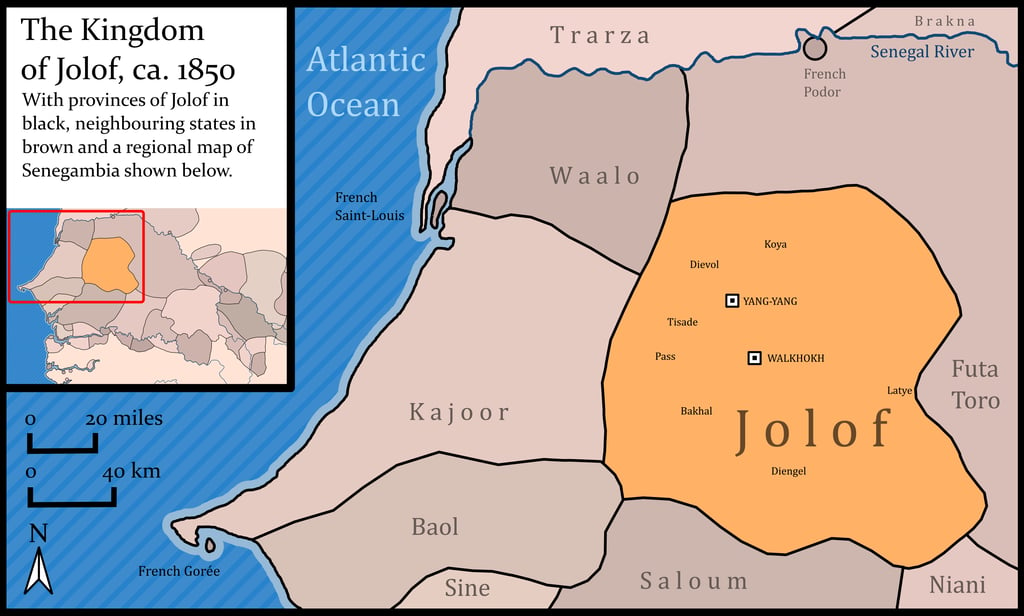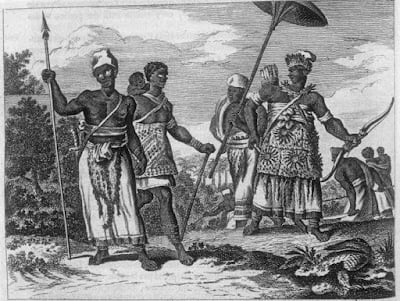
Famous West African Empires: The Jolof Empire
SENEGAL


Although Jollof is usually synonymous with the decadent West African dish, the eponymous meal signifies a far more powerful empire that existed in pre-colonial West Africa.
Map of Jolof Empire and its vassals
The Jolof Empire (also pronounced as Wolof, Djolof, and Oulof) existed in present-day Senegal and parts of Gambia from the 12th century and lasted to the late 15th and early 16th centuries. It was initially inhabited by the Sose and Serer people, who were later conquered by the Wolof.
Traditional oral archives, usually told by griots (Guewel by the Wolof and Serer people), indicated that the empire was named after Jolof Mbengue. Varying oral histories agree that Ndiadiane Ndiaye, either of Fulani origin or Serer nobility, mythically founded the state.


Legend suggests that Ndiaye was angered by his mother's remarriage to a slave after his father's passing, so much so that he retreated to an aquatic life in the Senegal River. It goes on to say that he emerged from the river to settle an ongoing dispute between villages. The villagers enamoured by him staged another dispute to kidnap him. It was that their intention was to willingly offer sovereignty of their lands to him.
Jolof Nobles
The Jolof Empire enjoyed enormous economic success due to the prosperity of their autonomous vassals, who traded textiles, gold, copper, cowries, and other goods with the Portuguese. Like most great empires, the Jolof Empire saw its fair share of succession disputes; however, it boasted a military with over 100,000 infantry and cavalry.
Their political system of governance, headed by a single Buurba, became their downfall. In 1480, the alleged treachery of Buurba Bemoi—who defected and sought refuge in Portugal, accepted Christianity, and became a puppet to be used in plans to forcefully reinstall him as a Christian leader by the Portuguese—was successfully thwarted. This came after an unpopular decision by Buurba Bemoi to relocate the seat of government to the coast.
These events set into motion the demise of the Jolof Empire. Trust between the Portuguese and Wolof disintegrated and resulted in broken trade relations. The French then seized the opportunity and replaced the Portuguese.
The Jolof Empire was one of the few African empires that maintained the practice of traditional religion and resisted both Christian and Islamic religious influence.


Modern Wolof Woman
Though the Jolof Empire fragmented in the early 16th century, its influence continues to resonate throughout West Africa. The Wolof people remain one of the dominant ethnic groups in Senegal and Gambia, and their language serves as a lingua franca across the region. The empire's resistance to external religious and political pressures exemplified a determination to preserve indigenous identity.
Perhaps most remarkably, the empire's name endures in global popular culture through Jollof rice, a dish that has become emblematic of West African culinary heritage. Every time this beloved meal is prepared and shared, it serves as an unwitting tribute to the once-mighty empire that shaped the region's history.



